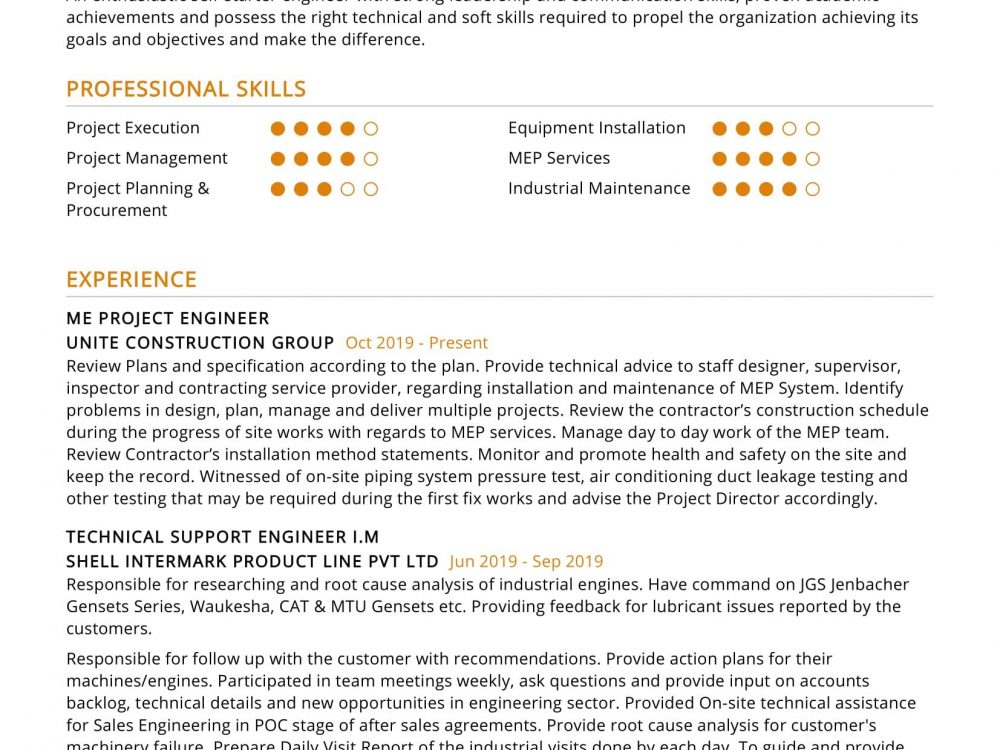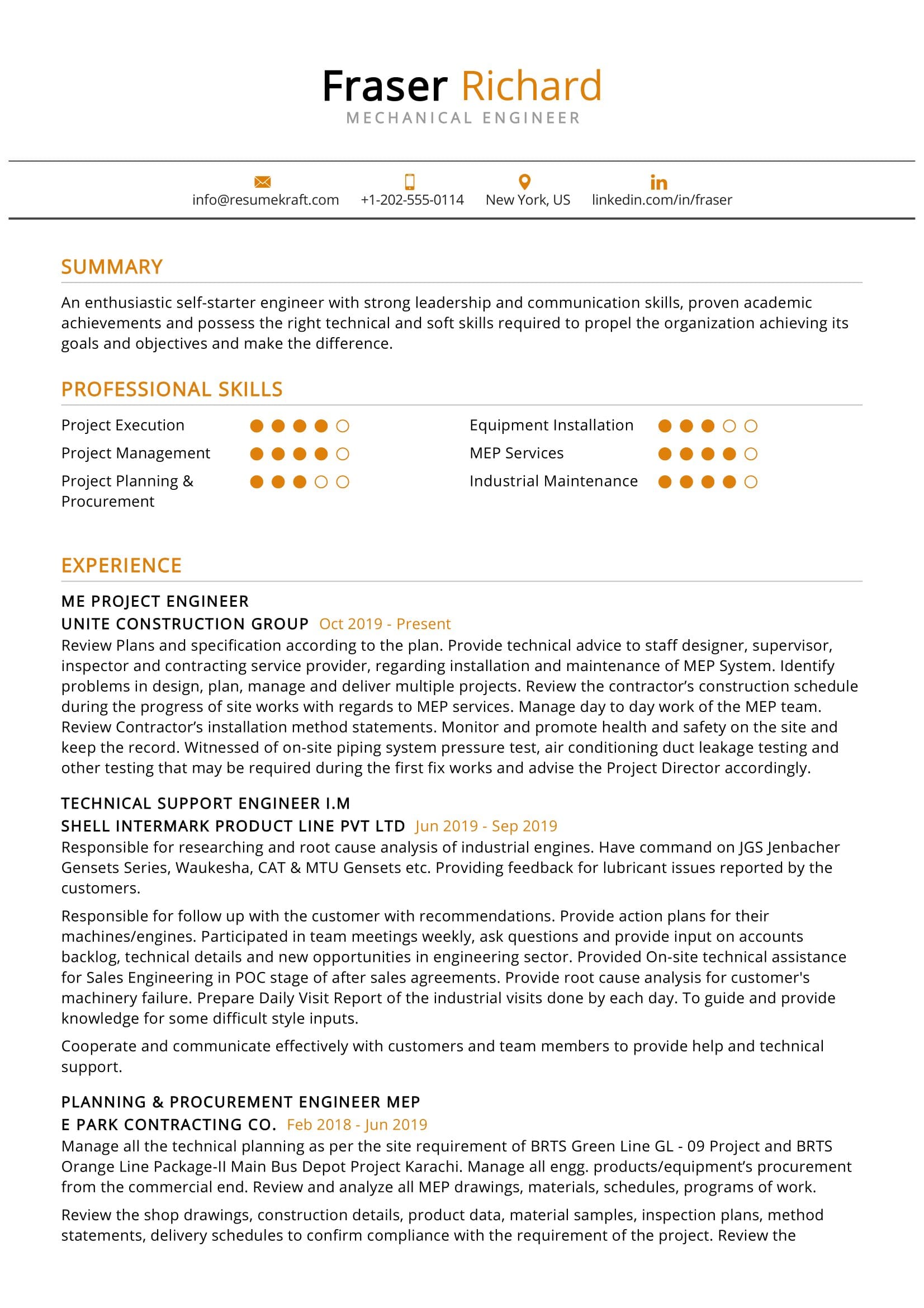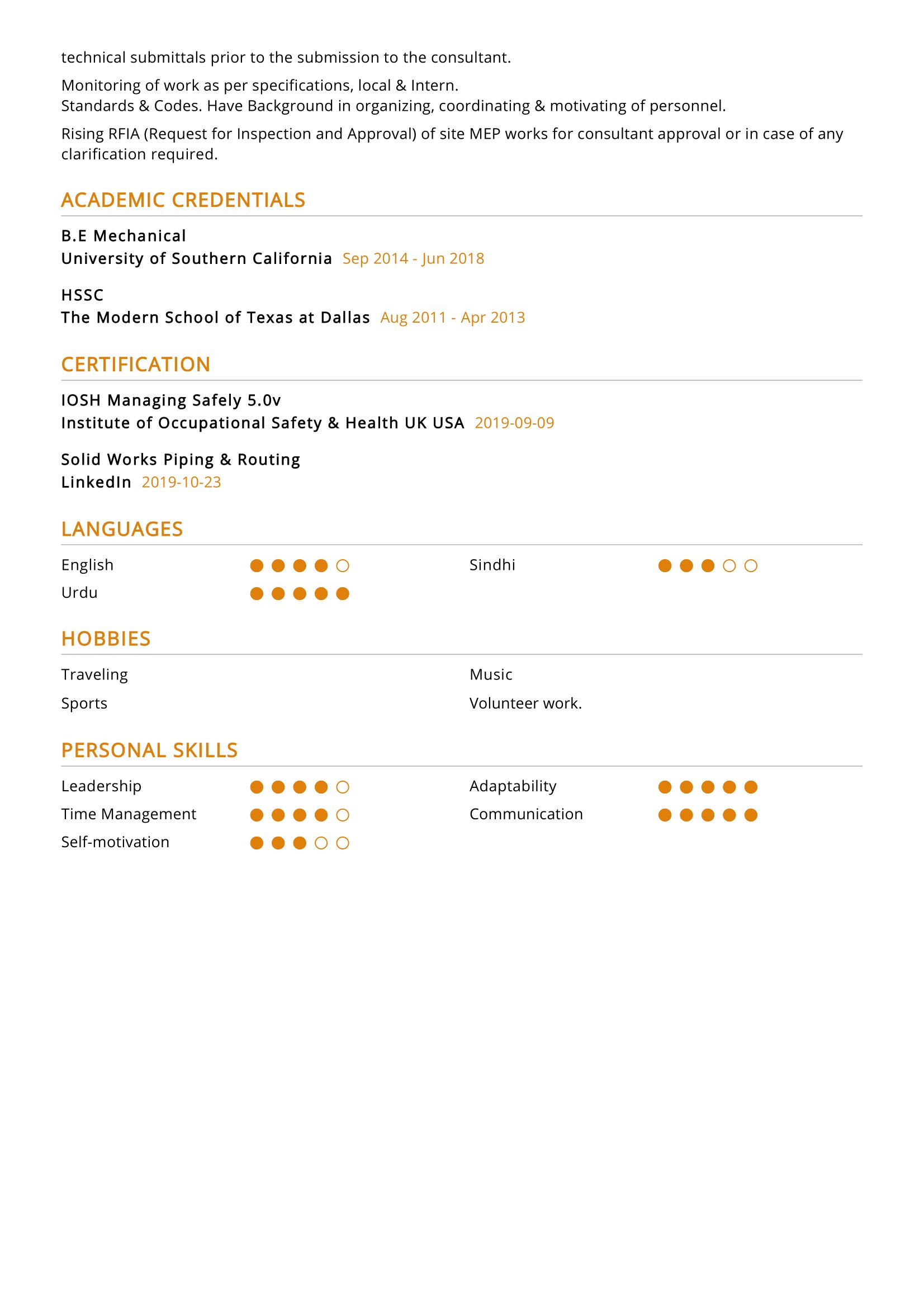Are you a mechanical engineer by profession and looking for an exciting career? We have good news for you! use our professional Mechanical Engineer Resume Example. You don’t have to start writing from scratch. Just click “Edit Resume” and modify it with your details. Update the template fonts and colors have the best chance of landing your dream job. Find more resume samples.
Mechanical Engineer Resume Example
Fraser Richard
Mechanical Engineer
Summary
An enthusiastic self-starter engineer with strong leadership and communication skills, proven academic achievements, and possess the right technical and soft skills required to propel the organization achieving its goals and objectives and make the difference.
Skills
Work Experience
ME PROJECT ENGINEER
UNITE CONSTRUCTION GROUP
Review Plans and specification according to the plan. Provide technical advice to staff designer, supervisor, inspector and contracting service provider, regarding installation and maintenance of MEP System. Identify problems in design, plan, manage and deliver multiple projects. Review the contractor’s construction schedule during the progress of site works with regards to MEP services. Manage day to day work of the MEP team. Review Contractor’s installation method statements. Monitor and promote health and safety on the site and keep the record. Witnessed of on-site piping system pressure test, air conditioning duct leakage testing and other testing that may be required during the first fix works and advise the Project Director accordingly.
TECHNICAL SUPPORT ENGINEER I.M
SHELL INTERMARK PRODUCT LINE PVT LTD
Responsible for researching and root cause analysis of industrial engines. Have command on JGS Jenbacher Gensets Series, Waukesha, CAT & MTU Gensets etc. Providing feedback for lubricant issues reported by the customers.
Responsible for follow up with the customer with recommendations. Provide action plans for their machines/engines. Participated in team meetings weekly, ask questions and provide input on accounts backlog, technical details and new opportunities in engineering sector. Provided On-site technical assistance for Sales Engineering in POC stage of after sales agreements. Provide root cause analysis for customer’s machinery failure. Prepare Daily Visit Report of the industrial visits done by each day. To guide and provide knowledge for some difficult style inputs.
Cooperate and communicate effectively with customers and team members to provide help and technical support.
PLANNING & PROCUREMENT ENGINEER MEP
E PARK CONTRACTING CO.
Manage all the technical planning as per the site requirement of BRTS Green Line GL – 09 Project and BRTS Orange Line Package-II Main Bus Depot Project Karachi. Manage all engg. products/equipment’s procurement from the commercial end. Review and analyze all MEP drawings, materials, schedules, programs of work.
Review the shop drawings, construction details, product data, material samples, inspection plans, method statements, delivery schedules to confirm compliance with the requirement of the project. Review the technical submittals prior to the submission to the consultant.
Monitoring of work as per specifications, local & Intern.
Standards & Codes. Have Background in organizing, coordinating & motivating of personnel.
Rising RFIA (Request for Inspection and Approval) of site MEP works for consultant approval or in case of any clarification required.
Education
B.E Mechanical
University of Southern California
HSSC
The Modern School of Texas at Dallas
Languages
- French
- English
- German
- Chines
Career Expert Tips:
- Always make sure you choose the perfect resume format to suit your professional experience.
- Ensure that you know how to write a resume in a way that highlights your competencies.
- Check the expert curated popular good CV and resume examples
Mechanical Engineer Resume with Writing Guide
If you’re seeking a job as a mechanical engineer, your resume should cover all the basics. It should demonstrate your skills for what they are. If it’s not clear what you’ve accomplished, do some research and put it down on paper or in an application. Here are some tips to help get started:
Mechanical Engineer Resume Writing Guide:
- Contact information: All the basic contact information should be included in your resume including a professional email address, a personal email address and your physical address.
- Objective: It may seem old-fashioned, but an objective statement is acceptable on a resume and shows that you know some good tips for creating a great resume. An objective statement shows prospective employers exactly what you are looking for in the job market.
- Education: This is extremely important, and you should list your educational background here. Make sure the dates are accurate and you include a GPA, major courses and a couple of recomended courses/programs.
- Skills: List your skills in their entirety for the position being sought. Put them in reverse chronological order to demonstrate that this is what you’ve done in the past and this is what you can do for the company being reviewed.
- Work Experience: This is the most important part of your resume. This should be in reverse chronological order, with a minimum of 4-5 years of work experience.
- Additional Information: Anything you want to add such as publications, projects, service learning or awards that you don’t think are necessary on the first page can go under “additional information.”
- References: This is extremely important as well, and should include names (or even numbers) and contact information for at least 3 references.
- Cover Letter: A cover letter is not necessary but may be an added bonus if it is requested in the job posting. If included, make sure it follows the same guidelines that are listed above.
- Keep copies of everything: The more copies you have of your resume, the better off you are when applying for jobs.
- References: This is extremely important as well, and should include names (or even numbers) and contact information for at least 3 references.
- Keep it simple: Use common sense when writing your resume down, don’t use fancy fonts or different colors to make your resume look appealing if they aren’t requested by the employer. It may only confuse them or make you appear unprofessional, which is the last thing you need in your job search!
- Skills: Use effective language to describe your expertise during your work experience. Use terms such as “implemented,” “developed,” “improved” and “enhanced” instead of words like “Created.”
- Try not to use the word wants/wanted: It is more polite and professional to focus on what you have done rather than what you want or wish to do.
- Be honest: If something in your resume doesn’t sound right, pick it out and remove it immediately!
Mechanical Engineer Responsibilities:
- Develop and maintain a well-equipped machine shop to fabricate hardware, such as gears, shafts and other parts.
- Determine the process, sequence and tools needed to complete assigned projects.
- Design industrial products such as gas turbines, aircraft engines, oil refineries or clean-air systems with CAD computer-assisted design software and specialized application programs.
- Research engineering problems to produce solutions that offer the highest quality, reliability and cost-effectiveness possible.
- Produce drawings that show and explain the various aspects of new or improved engineering concepts, models or industrial designs.
- Serve as technical advisor to other engineers in a variety of engineering fields, such as electrical or civil engineering.
- Design structures that are able to withstand physical forces and stresses placed upon them; lead efforts to develop buildings that meet government standards for safety and security.
- Brief other engineers regarding improvements or developments in design concepts, components or products; present ideas at meetings, conferences and work sessions for discussion and analysis.
Top 10 Must-have Mechanical Engineer Skills:
- Design: Design analytical computer use models to predict the performance of a mechanical system under given circumstances; may specialize in one aspect of design, such as details and equipment layout; must be able to make designs comply with specifications; prepare drawings and assist others in preparing theirs to submit to clients.
- Development: Apply new knowledge and technology for the design, development, and evaluation of products or systems; may specialize in a particular field (e.g., design fields).
- Design documentation: Create and revise documents that communicate design decisions; may specialize in one type of document, such as specifications, reports, manuals, contracts.
- Maintenance/Operations management: Control and manage operations for the design or construction of a product; may specialize in one area (e.g., machine shops, building maintenance).
- Marketing: Plan and coordinate marketing activities for products or services; assess market trends to recommend new product lines or services; perform marketing research; ensure that sales outlets are managed effectively to meet sales goals.
- Production/Operations Management: Control and manage production operations and activities for the manufacture or provision of a product; may oversee one or more manufacturing operations or production facilities; ensure that assembly, fabrication, and inspection activities are carried out according to plans.
- Technical service: Provide technical advice to customers in a specific area (e.g., designing, installing, maintaining equipment).
- Quality assurance: Perform quality of production and quality control tests to ensure that manufactured items meet requirements; may function as part of a team, working with engineers or technicians on maintaining standards.
- Research and development: Create, test, or improve new products, processes, or services; carry out experiments in laboratories for the purpose of developing new knowledge; design experiments to test the performance of products or systems under prescribed conditions.
- Development documentation: Compile and document data required to design, modify, or evaluate a product or process; may specialize in one type of document (e.g., technical publications).
Tips to write a Mechanical Engineer Resume Summary:
- Start with profile information.
- State your summary of qualifications.
- Use bullet points to list the technical skills that are most important to the job you are applying for: programming languages, computer-aided design, simulation, testing/analysis, research, and development etc
- Do not repeat your objective statement (which should be at the top of your resume).
- Don’t include salary history items unless they are essential to the job you are applying for.
- Make sure the dates on your resume are accurate and don’t leave off the years. [(I know it is hard…but if you change things, it will affect any future interviews.)]
- Make sure your resume reflects your skills at all job levels you’ve held (I always put my previous salary).
- To avoid using the word “duties”, use “tasks” or “responsibilities”.
- If you do tell about your work history, try to list the tasks and responsibilities in order of importance.
- The last thing you want to do is tell a potential employer too much, and risk not getting hired. So the trick is to know when to say enough!
How to write a Mechanical Engineer Resume with No experience:
- Make your resume easier to read by having the bullet points start on the left, and the summary at the top. Not sure what a bullet point is? It looks like this: |
- Don’t call them “resume” letters, since there are virtually no recruiters or hiring managers who even read those things. Call them “cover letters” or “resume letters.” That way you won’t sound like you’re begging for a job when you’re writing it.
(more related articles to be added…)
How to write a Mechanical Engineer Resume with experience:
- Start by listing your accomplishments first. I know it might sound counterintuitive, but it’s actually the best way to start. Don’t give the reader a chance to skip your resume simply because you’re not some amazing genius that will set them on fire when looking at your qualifications. No one expects you to be a genius, so don’t worry about it. What they want to know is that you can get the job done.
-Although there are other good reasons for this order (which I’ll get to later) 95% of the reason I prefer this order is because it’s more professional. - If you have a bachelor’s degree, list it first. If you have a master’s degree, make that list it second. Don’t put an MBA on your resume unless you’ve got one. An MBA shows initiative, drive, and ambition. All attributes which are good qualities for an employer to see in an employee.
- Show your skills. Show potential employers what you can do. Don’t just give them a list of irrelevant information like most people do.
-On the other hand, if you have a list of everything you did in school, there’s no need to include college activities. Just state that you earned your degree in whatever field, and leave it at that. - Put your employment history underneath the education section.
How to write a Mechanical Engineer Cover Letter:
- Title the cover letter:
- Salutation:
- Address the letter to “Dear Hiring Manager”:
- Paragraph 1: Introduce yourself:
- Paragraph 2: Identify how you found out about the job and why you are interested in it, using specific details from the help wanted ad:
- Paragraph 3: Include a reference to the help wanted ad in the paragraph:
- Paragraph 4: Talk about your skills and experience in specific, positive terms:
- Paragraph 5: Are you ready to apply? If so, how can we reach you?
- To follow-up a letter with interest or to ask for more information:
Key Takeaways:
- Tailor your resume to the job description.
- Include only the information relevant to the job you’re applying for.
- Make sure your resume is easy to read and free of typos!
- Use action verbs in your descriptions of past projects and tasks, instead of simple verbs like “prepared” or “managed”.



